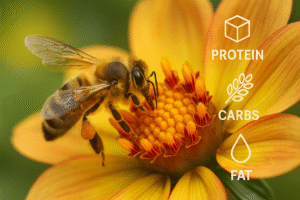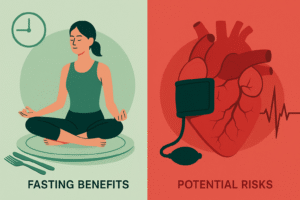Fun fact: There are more bacterial cells in your body than human ones.
That’s not a typo. You’re not just a person—you’re an ecosystem. An intricate, pulsing metropolis of human cells, yes—but also trillions of microbial hitchhikers that outnumber your own cells. In fact, depending on the estimate, you may be walking around with nearly 39 trillion bacteria and only 30 trillion human cells.
Welcome to the mind-bending reality of being a superorganism.
It sounds like science fiction, but it’s actually microbiology. And it’s changing everything we thought we knew about what makes us… us.
The Invisible Majority: Who’s Really in Charge?
It turns out that a huge portion of what we call “us” isn’t genetically human. These microbial passengers—bacteria, fungi, viruses, and archaea—live on our skin, in our mouth, inside our gut, and even in places we once believed were sterile, like our lungs and blood.
Scientists refer to this collection as the human microbiome, and it’s involved in digestion, immunity, metabolism, skin health, brain function, and more. Some researchers even go so far as to call the microbiome a “second brain.”
But here’s the kicker: these microbes don’t just support us—they help define us.
What Is a Superorganism, Anyway?
The term “superorganism” describes a living being composed of many organisms working together. Think of an ant colony or a beehive—individuals acting as parts of a larger, coordinated whole.
Now apply that idea to your body. Your human cells and microbial cells don’t just coexist; they collaborate. Your body is less like a standalone machine and more like a living city, with different species doing specialised jobs that keep the whole system running.
Dr. Martin Blaser, a microbiologist at New York University (NYU) Langone Health, calls this relationship “an ancient partnership.” Without your microbes, your immune system wouldn’t mature properly, your brain development could be impaired, and your digestion would fall apart.
Your Gut: A Bacterial Powerhouse
Of all the places microbes live, your gut is their capital city. The large intestine alone hosts over 1,000 species of bacteria. These bacteria help break down complex carbohydrates, produce essential vitamins like vitamin K and biotin, and manufacture short-chain fatty acids (SCFAs) that protect your colon and reduce inflammation.
Even more shockingly, gut bacteria help shape your cravings, influence your immune responses, and even affect how you respond to medication.
A 2020 study by the Weizmann Institute of Science found that two people eating the exact same meal can experience completely different blood sugar responses—depending on their gut microbiome. Your microbes are not just passive passengers; they’re active drivers of health.

You Started Collecting Microbes from Birth
You didn’t start life with a fully built microbiome. You inherited it. Babies born vaginally pick up microbes from their mother’s birth canal and gut, while C-section babies tend to start with skin microbes from the hospital.
Breast milk contains prebiotics (food for good microbes) and probiotics (live beneficial bacteria), helping to seed the infant microbiome. By age three, your microbiome starts to resemble an adult’s—but it continues to evolve with diet, environment, medication use, and even stress levels.
The Dirty Truth: Modern Life Is Messing With Your Microbiome
Here’s where it gets provocative. Our obsession with cleanliness, processed food, and antibiotics might be harming our inner ecosystem.
Many modern habits—like eating ultra-processed food, avoiding outdoor play, overusing hand sanitizers, and routinely popping antibiotics—have been linked to lower microbial diversity. And low diversity often correlates with chronic diseases like allergies, autoimmune disorders, diabetes, and even depression.
A study in urban vs. rural India found that children living in rural environments had far richer microbiomes—and far fewer allergies—compared to city kids. Our rush to sanitise everything may be sterilising away the very organisms that keep us healthy.
Case Study: The Amish vs. Urban Households
In a groundbreaking study comparing Amish children (who grow up around farms and animals) to urban kids, researchers discovered that the Amish children had significantly lower rates of asthma and allergies.
Why? Their constant exposure to a wide variety of microbes helped train their immune systems from an early age. The takeaway? A little dirt might be a good thing.
The Microbiome-Mind Connection
One of the most intriguing developments in microbiome science is the connection between your gut and your brain, known as the gut-brain axis.
Your gut bacteria produce neurotransmitters like serotonin, dopamine, and GABA (gamma-aminobutyric acid)—all of which influence your mood and mental clarity. In fact, over 90% of your body’s serotonin is made in the gut, not the brain.
No wonder people with gut imbalances often report anxiety, brain fog, or depression. Your microbes might be messing with your mood.
How to Support Your Inner Ecosystem
If you’re a superorganism, then you owe it to yourself—and your microbial citizens—to keep the peace. Here’s how:
- Eat the rainbow: Fibre-rich fruits, vegetables, whole grains, and legumes feed beneficial microbes.
- Fermented foods: Curd, idli, dosa, pickles, and kombucha introduce friendly bacteria.
- Avoid unnecessary antibiotics: They kill good microbes along with the bad.
- Go outside: Exposure to soil, animals, and fresh air helps diversify your microbiome.
- Manage stress: Chronic stress disrupts microbial balance and weakens immunity.
Conclusion: You Are More Than Human
When you realise you’re more bacteria than human, the mirror starts to reflect something deeper. Your identity isn’t confined to your DNA—it’s written in your microbes, your food, and your environment.
Being a superorganism means your health isn’t just about what’s happening in your organs, but also what’s happening in your microscopic inner world.
So the next time you reach for food, touch the earth, or even hug someone—remember, you’re shaping your microbial self. And that invisible you? It might just be the most important version yet.
Author’s Note
Modern science is revealing that our microbes may be just as vital to our health as our hearts or brains. Respecting your inner ecosystem isn’t woo-woo—it’s a return to ancient biological wisdom. You’re not alone in your body. And that’s a beautiful thing.
G.C., Ecosociosphere contributor.
References and Further Reading
- NIH Human Microbiome Project
- Scientific American: You Are Mostly Microbes
- Why Gut Health is Central to Digestion – Total Health Care. https://www.total-health-care.com/why-gut-health-is-central-to-digestion/




